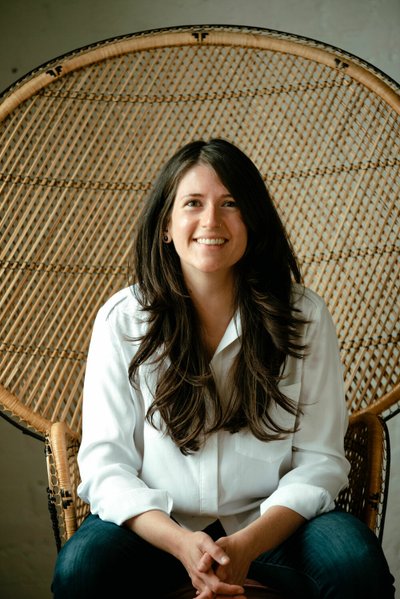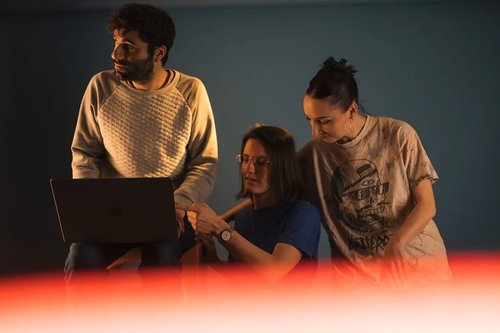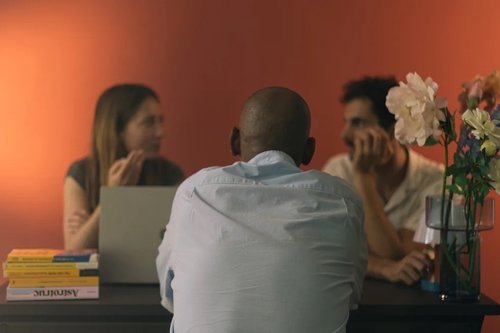How to showcase soft skills in an interview without faking who you are
Nov 08, 2022 - updated Mar 12, 2024
5 mins


Writer, comedy writer, and HR leader based in New York City.
When preparing for an interview, you may be tempted to focus on explaining how much you want the position, highlighting how great you were at your last job, and trying to stand out from the other X number of applicants striving for the same role. However, there’s one aspect of the interview that you shouldn’t neglect: demonstrating your soft skills—and it’s no easy feat.
Soft skills are the qualities organizations look for that are not easy to measure, such as leadership, emotional intelligence, and adaptability. Tech companies are ahead of the game on this and they like those they hire to have soft skills that will dovetail neatly with company values. For example, X (formerly Twitter) looks for people who “move fast, feel free to be themselves, and have fun.” Slack hires those who have a high degree of technical competence but who also embody its values, which include empathy and playfulness. Google interviews for something called “Googlyness.”
If all of this sounds made up, well, it is and it isn’t. Soft skills often reflect the culture of the time. A century ago, the first personality skills assessment—the Woodworth Personal Data Sheet—included such questions as “Are you troubled with dreams about your work?” and “Have you ever fainted away?” Nowadays, you’re more likely to hear “What’s the craziest thing you’ve ever done?” or “What animal do you wish you could be?” If some vestige of capitalism remains intact in another 100 years, who knows what your AI interviewer will ask? “Do you drive your flying car for the journey or the destination?” or “Can you believe we used to let men be president?”
But if you’re going to ace the soft skills portion of an interview today, you need to know: how do companies look for “Googlyness?” How do recruiters determine who has the soft skill it needs and who doesn’t? How can you bring your best soft skills to the table? We spoke to two experts to get the inside scoop.
How companies identify who possesses a soft skill
Jacqui Maguire, tech recruiter turned VP of People at restaurant chain Tacombi in New York City, says she uses behavioral interviewing techniques, which involves taking a structural approach based on the idea that past actions predict future behavior. She explains, “This is essentially any question that starts with, ‘Tell me about a time when. . .’”
One of Tacombi’s company values is “adventure.” To assess if a candidate has the soft skills associated with that, their recruiters use the question, “Tell me about a time you took a risk.” If the candidate’s story ends in “and I’ll never do it again,” that’s a pretty good indication the candidate prefers stability over adventure, which is okay, Maguire says. A report from Checkster, a reference checking company, found that 78% of job applicants have or would consider lying in an interview. However, when it comes to lying about your soft skills, Maguire explains that it serves no one in the long run.
When a candidate’s story feels too rehearsed, Maguire says, she’ll ask them for another example. Recent college graduates are often trained to prepare “the story of the win, the challenge story . . . we’re teaching people to put on a fake face to interview,” she says. Telling the interviewer what you think they want to hear backfires, she adds. If you’re not honest, “you’re going to end up quitting pretty quickly and/or unfortunately, getting terminated,” she says.
Christopher Tabora, a founding member of the recruiting team at TikTok, says the social media app’s talent specialists assess each candidate as an individual. “If you’re interviewing for the sales team, can you keep up with that team’s energy? We look for baseline energy vs. skills,” he says. He says that soft skills are weighted equally with hard skills at TikTok, where a lot of the job can be learned. “You’re coming in with all these skills, that’s amazing. That’s great. At the end of the day . . . you’re gonna learn everything,” he says, adding that genuine soft skills “help new hires to navigate this ambiguous environment.”
Take a hard look at your soft skills
With so much to consider, how can you work out what your strongest soft skills are in a way that will lead to an amazing career fit? Here are a few tips to get you started:
1. Ask people around you what your soft skills are
Tabora says a lot of times, we’re not conscious of how we behave: “We don’t realize our superpowers.” You might be amazing at empowering others, or using data to tell a story, but not realize how special that is, he adds. “Take a step back,” Tabora says, and ask someone you trust “what you do effectively, and how you showcase that to others.”
Asking former employers for references can also be a good way to identify your own soft skills. Suppose your old boss writes a letter of recommendation saying how you “adapted to a new environment quickly, collaborated effectively with other teams, and always met deadlines,” for example. In that case, there are three soft skills for you to list and develop in your interview: adaptability, teamwork, and time management.
2. Know what soft skills are sought after and develop them
Take a class, find a coach, shadow a mentor—like getting better at a hard skill, if there’s a soft skill you want to improve on, there are resources out there to help. A 2022 survey from Zety found that 61% of employers value soft skills over hard skills, with the most sought-after soft skills including teamwork, emotional intelligence, creativity, and problem-solving. A 2022 report from Adobe echoes this, adding that employers are also looking for active communication skills, conflict management skills, and, in true post-Covid fashion, virtual presence etiquette.
Online courses can be a great way to upskill, reskill, or simply sharpen your existing soft skills. Yale University shared an insightful grid on what soft skills look like behaviorally and what online courses you can take to develop them.
3. Answer interview questions with examples
Tabora points out that there’s always an opportunity for you to tell a story that will highlight your soft skills, even if the interviewer doesn’t say “Tell me about a time when . . . ” The key is to “show me rather than tell me,” he says, which means you need to give real examples of actions you have taken. You’ll stand out if you relate genuine tales from your professional and personal life. “We really just want to see people who are passionate about what they do. Because I think that translates to passion in your work,” he says. Thousands of people apply to work at TikTok, but not every one of those even has the app, he says.
There are many elements that go into preparing for a job interview, and being able to confidently list and explain the soft skills you genuinely possess is one of the most important. And when talking about your soft skills, honesty is key. Lastly, even if you never achieve peak “Googlyness,” if you bomb at your next interview, or if you make a misstep in your career—you are enough.
Photo: Welcome to the Jungle
Follow Welcome to the Jungle on Facebook, LinkedIn, and Instagram to get our latest articles every day, and don’t forget to subscribe to our newsletter!

More inspiration: Ace your job interview

Why are you leaving your job? Here's how to nail the answer
Caught off guard by 'Why are you leaving your job?' Here's how to flip this tricky question into a spotlight on your goals and potential.
Dec 24, 2024

Standing out in an interview: Creative responses to common questions
Answering common interviews with common responses isn't going to get you far in today's job market. Here's how to truly stand out!
Nov 26, 2024

The Pratfall Effect: Can screwing up in a job interview make you more likable?
Mistakes you make in a job interview could actually work to your advantage ...
Oct 14, 2024

How to bring up your long-term career goals in an interview
Be honest but strategic. The key is aligning your goals with the role while showing flexibility and ambition. Avoid faking it!
Sep 24, 2024

Is honesty the key to discussing your weaknesses?
Are your weaknesses holding you back in an interview? A bit of honesty can flip the script and make your flaws work in your favor.
Aug 21, 2024
The newsletter that does the job
Want to keep up with the latest articles? Twice a week you can receive stories, jobs, and tips in your inbox.

Looking for your next job?
Over 200,000 people have found a job with Welcome to the Jungle.
Explore jobs